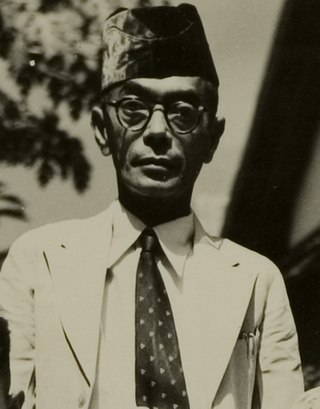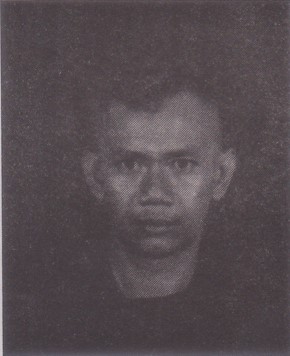
Bekasi is the city with the largest population in the province of West Java, Indonesia, located on the eastern border of Jakarta. It serves as a commuter city within the Greater Jakarta. According to the 2020 Census by Statistics Indonesia (BPS), Bekasi had 2,543,676 inhabitants. The (revised) official estimate for mid 2023 was 2,513,669. It lies within the largest metropolitan area in Indonesia (Jabodetabek). The city is bordered by Bekasi Regency to the north and the east, Bogor Regency and Depok City to the south, and the city of East Jakarta to the west.
A regency, sometimes incorrectly referred to as a district, is an administrative division of Indonesia, directly under a province and on the same level with city (kota). Regencies are divided into districts. The average area of Indonesian regencies is about 4,578.29 km2 (1,767.69 sq mi), with an average population of 670,958 people.

Minahasa Regency is a regency in North Sulawesi, Indonesia. Its capital is Tondano. It covers an area of 1,141.64 km2 and had a population of 310,384 at the 2010 Census; this rose to 347,290 at the 2020 Census, and the official estimate as at mid 2023 was 351,920.

The Mongondow or Bolaang Mongondow people are an Austronesian ethnic group native to western part of the North Sulawesi. The Mongondows are predominantly Muslim. They have traditionally been concentrated in the provinces of North Sulawesi and Gorontalo. This ethnic group used to be united by a single entity, the Kingdom of Bolaang Mongondow, which became the western regencies of North Sulawesi after the Indonesian independence.

The Greater Jakarta Metropolitan Region of the Indonesian National Police, known locally as Polda Metro Jaya, is the regional level of the Indonesian National Police which covers nearly the entire Jakarta metropolitan area, comprising Jakarta, Tangerang, South Tangerang, Bekasi, Bekasi Regency, and Depok. Polda Metro Jaya is led by a local police chief who held the Rank of Inspector General of Police. Polda Metro Jaya is the only regional police in Indonesia which has the A+ Status due to its position to maintain a huge area of security and order in the capital of Indonesia (Jakarta) containing multiple regions and cities that surround the capital. The use of the word "Metropolitan" is because Jakarta is a metropolitan city.

The West Java Regional House of Representatives is the unicameral legislature of the Indonesian province of West Java.
In Indonesian law, the term "city" is generally defined as the second-level administrative subdivision of the Republic of Indonesia, an equivalent to regency. The difference between a city and a regency is that a city has non-agricultural economic activities and a dense urban population, while a regency comprises predominantly rural areas and is larger in area than a city. However, Indonesia historically had several classifications of cities.

Hilman Djajadiningrat was an Indonesian aristocrat and politician.

The Governor of North Sumatra is the highest office in the province of North Sumatra. The governor of North Sumatra is an elected official who is responsible for leading the government in North Sumatra, proposing and enacting regional laws, and representing the North Sumatra province inside and outside the court. The governor alongside the deputy governor and 100 members of the Regional People's Representative Council are accountable for the strategic government of the province of North Sumatra.

The Regent of Thousand Islands, officially the Administrative Regent of Thousand Islands, is the highest office in the regency of Thousand Islands. Unlike regents in other regencies in Indonesia, the regent is appointed directly by the governor. The regency has no regional parliament, thus making the regent responsible to the governor.

Muhammad Kaharuddin III was an Indonesian politician and royal who was the 16th Sultan of Sumbawa, a senator of the United States of Indonesia, and the regent of Sumbawa Regency between 1959 and 1960. He was also active in the politics of the State of East Indonesia, where he chaired its legislature between 1947 and its dissolution in 1950.

Kali Bekasi is a river that originates from a confluence of the Cikeas and Cileungsi rivers in the south of the border between the city of Bekasi and Bogor Regency. It flows northward, cutting through the city center of Bekasi towards the downstream area in Bekasi Regency, where it merges the flood control canal CBL (Cikarang-Bekasi-Laut), built during the era of President Soeharto's government in 1977 to prevent flooding in the northern coastal region of Bekasi. This canal intercepts numerous tributaries coming from the south, spanning from Cikarang to Bekasi. From the confluence point in the Babelan district, its flow is directed northwest until it meets the eastern of Jakarta Bay, part of the Java Sea.

Memet Rochamat was an Indonesian bureaucrat. He spent most of his career in the Bekasi, with his final position as the regional secretary from 1999 to 2003. He was then transferred to the Ministry of State Apparatus Utilization and Bureaucratic Reform, where he lost two times for the bid as the regent of Bekasi. On 21 June 2010, Memet committed suicide by hanging himself.

Abdul Fatah was an Indonesian military officer and politician. He was the regent of Bekasi from 1973 until 1983.

Muhammad Nausan bin Rindon was the Chief of the Bekasi Second-Level Autonomous Region from 1958 until 1960.

Solichin Dachlan is an Indonesian military officer and politician who became the Regent of Serang from 1998 to 1999.

The Governor of West Java is the executive head of the West Java Province. He is responsible for running the government together with his deputy and members of the West Java Regional People's Representative Council as the legislative. The Governor of West Java is an elected politician who, along with the vice governor and 120 members of the Regional People's Representative Council (DPRD), is accountable for the strategic government of the province of West Java.

Maun, also known as Ismaun, was an Indonesian military officer who served as the Regent of Bekasi from 1960 until 1967.
Major Madmuin Hasibuan, often written Matmuin Hasibuan and known as M. Hasibuan;, was an Indonesian politician and military officer.
















